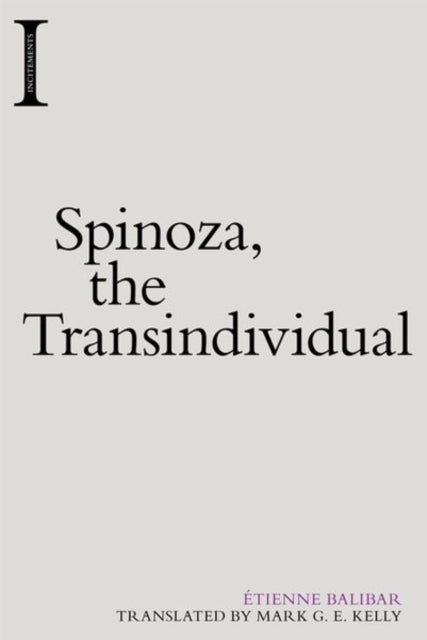Etienne Balibar
Spinoza, the Transindividual
Spinoza, the Transindividual
YOU SAVE £24.91
- Condition: Brand new
- UK Delivery times: Usually arrives within 2 - 3 working days
- UK Shipping: Fee starts at £2.39. Subject to product weight & dimension
Bulk ordering. Want 15 or more copies? Get a personalised quote and bigger discounts. Learn more about bulk orders.
Couldn't load pickup availability
- More about Spinoza, the Transindividual
Balibar's book explores Spinoza's ontology, situating him in relation to Marx and Freud and connecting him to Gilbert Simondon's concept of the transindividual. It presents a significant development in Balibar's thought, showing how transindividuality operates at both the individual and collective levels.
Format: Hardback
Length: 224 pages
Publication date: 22 September 2020
Publisher: Edinburgh University Press
Tienne Balibar's Exploration of Spinoza's Ontology
Tienne Balibar, one of the foremost living French philosophers, builds on his landmark work "Spinoza and Politics" with this exploration of Spinoza's ontology. Balibar situates Spinoza in relation to the major figures of Marx and Freud as a precursor to the more recent French thinker Gilbert Simondon's concept of the transindividual. Presenting a crucial development in his thought, Balibar takes the concept of transindividuality beyond Spinoza to show it at work at both the individual and the collective level.
Balibar's Exploration of Spinoza's Ontology
Balibar's exploration of Spinoza's ontology begins with a critical analysis of Spinoza's metaphysics. He argues that Spinoza's ontology is characterized by a radical rejection of the traditional notion of substance and a focus on the dynamic relationship between mind and body. Balibar highlights the importance of Spinoza's concept of "substance" as a means of understanding the nature of reality and the relationship between different entities. He suggests that Spinoza's ontology provides a framework for understanding the complex and interconnected nature of the world.
Balibar's Relation to Marx and Freud
Balibar's exploration of Spinoza's ontology also involves a comparison with the major figures of Marx and Freud. He argues that Spinoza's ontology provides a basis for understanding the social and political structures of society. Balibar suggests that Spinoza's concept of "substance" can be used to explain the dynamics of power and domination in society. He also highlights the similarities between Spinoza's ontology and Freud's theory of the unconscious. Balibar suggests that Spinoza's ontology can provide a framework for understanding the psychological and social dimensions of human experience.
Balibar's Concept of Transindividuality
Balibar's exploration of Spinoza's ontology leads him to develop the concept of transindividuality. He argues that transindividuality is a concept that goes beyond the individual and encompasses the collective. Balibar suggests that transindividuality is a state of being in which individuals are connected to each other and to the world in a profound and meaningful way. He suggests that transindividuality is a necessary condition for the development of a more just and equitable society.
Balibar's Application of Transindividuality
Balibar's exploration of Spinoza's ontology leads him to apply the concept of transindividuality to various social and political contexts. He suggests that transindividuality can be used to address issues such as social inequality, political oppression, and environmental degradation. He argues that transindividuality can provide a framework for creating a more inclusive and democratic society. Balibar also suggests that transindividuality can be used to promote individual and collective well-being.
Conclusion
Tienne Balibar's exploration of Spinoza's ontology is a significant contribution to the field of philosophy. Balibar situates Spinoza in relation to the major figures of Marx and Freud as a precursor to the more recent French thinker Gilbert Simondon's concept of the transindividual. Balibar's exploration of transindividuality provides a framework for understanding the complex and interconnected nature of the world and the development of a more just and equitable society. Balibar's application of transindividuality to various social and political contexts demonstrates the potential of this concept to address issues such as social inequality, political oppression, and environmental degradation. Balibar's exploration of Spinoza's ontology is a must-read for anyone interested in philosophy and social justice.
Weight: 334g
Dimension: 143 x 198 x 18 (mm)
ISBN-13: 9781474454278
This item can be found in:
UK and International shipping information
UK and International shipping information
UK Delivery and returns information:
- Delivery within 2 - 3 days when ordering in the UK.
- Shipping fee for UK customers from £2.39. Fully tracked shipping service available.
- Returns policy: Return within 30 days of receipt for full refund.
International deliveries:
Shulph Ink now ships to Australia, Belgium, Canada, France, Germany, Ireland, Italy, India, Luxembourg Saudi Arabia, Singapore, Spain, Netherlands, New Zealand, United Arab Emirates, United States of America.
- Delivery times: within 5 - 10 days for international orders.
- Shipping fee: charges vary for overseas orders. Only tracked services are available for most international orders. Some countries have untracked shipping options.
- Customs charges: If ordering to addresses outside the United Kingdom, you may or may not incur additional customs and duties fees during local delivery.


